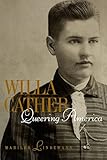Willa Cather : Queering America / Marilee Lindemann.
Material type: TextSeries: Between Men-Between Women: Lesbian and Gay StudiesPublisher: New York, NY : Columbia University Press, [1999]Copyright date: ©1999Description: 1 online resourceContent type:
TextSeries: Between Men-Between Women: Lesbian and Gay StudiesPublisher: New York, NY : Columbia University Press, [1999]Copyright date: ©1999Description: 1 online resourceContent type: - 9780231113250
- 9780231500272
- Feminism and literature -- United States -- History -- 20th century
- Homosexuality and literature -- United States -- History -- 20th century
- Lesbians -- United States -- Intellectual life
- Love-letters -- History
- Sexual orientation in literature
- Women and literature -- United States -- History -- 20th century
- LITERARY CRITICISM / American / General
- 813/.52 21
- PS3505.A87 Z724 1999eb
- online - DeGruyter
- Issued also in print.
| Item type | Current library | Call number | URL | Status | Notes | Barcode | |
|---|---|---|---|---|---|---|---|
 eBook
eBook
|
Biblioteca "Angelicum" Pont. Univ. S.Tommaso d'Aquino Nuvola online | online - DeGruyter (Browse shelf(Opens below)) | Online access | Not for loan (Accesso limitato) | Accesso per gli utenti autorizzati / Access for authorized users | (dgr)9780231500272 |
Frontmatter -- Contents -- Note on Texts and List of Abbreviations -- Acknowledgments -- Introduction: The Novelist, the Critic, and the "Queer" -- PART I. Fear of a Queer Prairie: Figures of the Body and/ as the Nation in the Letters and Early Novels -- 1. Driving One-Handed: The Law, the Letter, and the Unsanctioned Voice -- 2. "Filling Out Nice": Body-Building and Nation-Building in the Early Novels -- PART II. Queering the "Classics": Willa Cather and the Literary History of the United States -- 3. "In a Prohibition Country": The Culture Wars of the 1920s -- 4. Comrades and Countrymen: Queer Love and a Dream of "America" -- Conclusion: Queer (R)Age-Notes on the Late Fiction and the Queering of the World -- Notes -- Works Cited -- Index
restricted access online access with authorization star
http://purl.org/coar/access_right/c_16ec
Although it has been proven posthumously by scholars that Willa Cather had lesbian relationships, she did not openly celebrate lesbian desire, and even today is sometimes described as homophobic and misogynistic. What, then, can a reassessment of this contentious first lady of American letters add to an understanding of the gay identities that have emerged in America over the past century? As Marilee Lindemann shows in this study of the novelist's life and work, Cather's sexual coming-of-age occurred at a time when a cultural transition was recasting love between women as sexual deviance rather than romantic friendship. At the same time, the very identity of "America" was characterized by great instability as the United States emerged as a modern industrial nation and imperial power. Indeed, both terms, "queer" and "America," achieved fresh ideological potency at the turn of the century. Willa Cather: Queering America is an enlightening unpacking of Cather's writings, from her controversial love letters of the 1890s--in which "queer" is employed to denote sexual deviance--to her epic novels, short stories, and critical writings. Lindemann points to the "queer" qualities of Cather's fiction--rebellion against traditional fictional form, with sometimes unlikable characters, lack of emphasis on heroic action, and lack of engagement in the drama of heterosexual desire.
Issued also in print.
Mode of access: Internet via World Wide Web.
In English.
Description based on online resource; title from PDF title page (publisher's Web site, viewed 08. Jul 2019)


